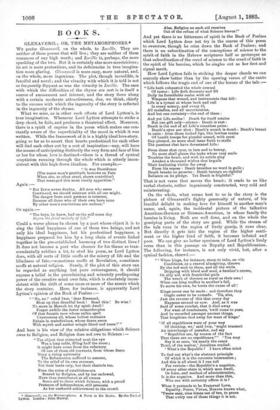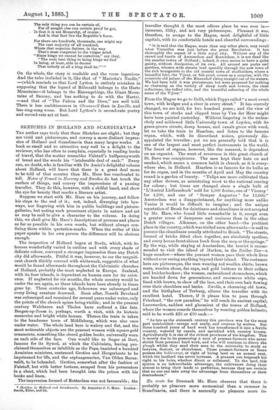BOOKS.
GLENAVERIL ; OR, THE METAMORPHOSES.*
Wn prefer Glenaveril, on the whole, to Lucille. They are neither of them poems that will live ; they are neither of them romances of any high merit; and Lucille is, perhaps, the more sparkling of the two. But it is certainly also more meretricious ; its art is more pretentious, and its deficiencies in true imagina- tion more glaring. Glenaveril is more easy, more natural, and, on the whole, more ingenious. The plot, though incredible, is fanciful and novel ; and the vivacity with which it is told is not so frequently flippant as was the vivacity in Lucille. The ease with which the difficulties of the rhyme are met is in itself a
source of amusement and interest, and the story flows along with a certain moderate attractiveness, due, we think, chiefly to the success with which the ingenuity of the story is reflected in the ingenuity of the rhyme.
What we miss, as in other such efforts of Lord Lytton's, is true imagination. Whenever Lord Lytton attempts to strike a deep chord, he fails, and produces a theatrical effect. Moreover, there is a spirit of caprice in the poem which makes one con- stantly aware of the superficiality of the mood in which it was written. While the framework of it is a highly ideal love-story, going so far as to assert that hearts predestined for each other will find each other out by a sort of inspiration—nay, will have the means of anticipating distinctly the very form and face of him or her for whom love is destined—there is a thread of cynical scepticism running through the whole which is utterly incon- sistent with this high.flown idealism. For example,—
" It was Providence (The name man's gratitude bestows on Fate When she, so often cruel, shows contrition) That managed this most timely apparition."
Again But Error never donbta. All men who seem Convinced, we should mistrust with all our might. The danger from such persons is extreme, Because all those who of their own have none By other men's convictions are undone."
Or again :—
" The boys, he knew, had on the self.same day Begun the fatal malady of life."
Could a worse phrase be chosen by a poet whose object it is to sing the ideal happiness of one of those two beings, and not only his ideal happiness, but his predestined happiness, a happiness prepared for him by a long chain of events linked together in the pre-established harmony of two distinct lives P It does not become a poet who chooses for his theme so tran- scendentally sublime a lot, to stud his poem, as Lord Lytton does, with all sorts of little scoffs at the misery of life and the blindness of fate,—sometimes scoffs at Revelation, sometimes scoffs at natural religion. Surely, if the plot of this story can be regarded as anything but pure extravagance, it should express a belief in the preordaining and minutely predisposing power of the creative mind over fate, which is absolutely incon- sistent with the drift of some score or more of the sneers which the story contains. Here, for instance, is apparently Lord Lytton's opinion of the Book of Psalms :—
" ' No, no !' cried Ivor, dear Emanuel,
Shut up that dreadful book ! Read this ! Be wise !
No more in Mesech let thy spirit dwell !
Forget awhile the fierce misanthropies Of that fanatic race whose sullen spell Unsweetens all, whose holiest ecstasies Exhale in maledictions, whose fierce seers With myrrh and amber mingle blood and tears !' "
And here is his view of the relative obligations which Science owes to Religion, and Religion does not owe to Science :—
" The object that attracted next the eye
Was a long table, filling half the room ; It might have come from the refectory Of one of those old convents, from whose doom Many a rising university The Reformation suffered to assume, To the relief of its own revenue, Not their lands only, but their chattels too.
Even the ruins of establishments Reared by Religion, and by her endowed, Have thus contributed at all events Some aid to those which Science, with a proud Pretence of independence, still presents As her unshared achievement to the crowd.
• Gleaaveril; or, the Metamorphoses. A Poem in Six Books. By the Ea,lcf Lytton. London : John Murray.
Alas, Religion no such aid receives Out of the refuse of what Science leaves !"
And yet there is no bitterness of spirit in the Book of Psalms which Lord Lytton does not try in the course of this poem to overcrow, though he cries down the Book of Psalms; and there is no subordination of the conceptions of science to the spirit of faith in the Hebrew scriptures half so grotesque as that subordination of the creed of science to the creed of faith in the spirit of his heroine, which he singles out as her first and signal merit.
How Lord Lytton fails in striking the deeper chords we can scarcely show better than by the opening verses of the canto- which follows the tragic end of one of the heroes of the tale :—
" Life hath exhausted the whole arsenal
Of terror : Life doth decorate and fill Daily its formidable realm with all Weapons that wound, and instruments that kill : Life is a tyrant at whose beck and call Is every misery, and every ill, All maladies, and all uncertainties, And but one certainty—the end of these : And yet Life smiles ! Death for itself retains But one gift only—silence : Death is rest : Death is the end of all Life's countless pains : Death's eyes are shut : Death's month is dumb : Death's breast Is calm : from those locked lips, like lawless trains Of bandit troops for plunder armed, with crest Gay-plumed, no more shall issue forth to strife The passions that have devastated Life: From those shut eyes, to lure and to betray, No more shall gleam the looks whose very smile Troubles the heart, and with its subtle play Awakes a thousand wishes that beguile Their hesitating victim far away From his repose : Death breathes no word in guile ; Death breaks no promise : Death betrays no rightful Reliance on its pledge. Yet Death is frightful.'
That is not verse that moves the heart ; it reads to us like verbal rhetoric, rather ingeniously constructed, very cold and uninteresting.
On the whole, what seems best to us in the story is the picture of Glenaverft's flighty generosity of nature, of hia fanciful delight in making love for himself in another man's name, and, again, the incidental picture of the talkative American-German or German-American, in whose family the heroine is living. Both are well done, and on the whole the gossiping parts of the story are good. While the stream of the tale runs in the region of lively gossip, it runs clear. But directly it gets into the region of the higher senti- ment or the higher kind of faith, it becomes inflated and poor. We can give no better specimen of Lord Lytton's lively verse than in this passage on Royalty and Republicanism. The following, for instance, is not only vivid, but, after a cynical fashion, shrewd :— "'When kings, for instance, stoop to take, on vile
Conditions, as a craved almsgiving, thrown By the red mob to them, and all the while Dripping with blood and mud, a brother's crown, Or slily aid, with fratricidal guile The wreck of thrones as royal as their own ! When one king traffics in another's fall, To serve his own, he hurts the cause of all !
Kings never can be made : and therefore they Ought never to be unmade. 'Tis, alas, Just the reverse of this that every day Happens around us now. And, as it was Said of some combat, that it died away For want of combatants, 'twill come to pass, And be recorded amongst ancient things, That kingdoms died away for want of kings: If all republicans were of your way Of thinking, we, ' said Ivor, might transact An interchange of paradox, and say "Republics are, by reason of the fact That there are no republicans." " You may Say it at once, 'tis nearly the exact Truth of the matter,' Jonathan replied.
What's the Republic ? I have often tried To find out what's the abstract principle Of which it is the concrete incarnation,. And this is all about it I can tell For certain—the Republic's a negation.
Of every other state in which men dwell,. Or form, and method of administration,.
It is the negative. And more than this,. Who can with certainty affirm it is ?
When it pretends to be Fraternal Love, Equality, Peace, Virtue, Heaven knows what, 'Twere easy, nine times out of ten, to prove That every one of these things it is not.. The only thing you can be certain of, For of nought else can certain proof be got, Is that it is not Monarchy, of course : And in that fact lies the Republic's force.
For there are hundreds, thousands, one might say
The vast majority of all mankind, Whom that negation flatters, in the way That's most congenial to the vulgar mind. "Since kings we cannot be ourselves," say they, "The next best thing to being kings we find In being, at least, able to decree
That nobody at all a king shall be." ' "
On the whole, the story is readable and the verse ingenious. And the tales included in it, like that of "Marietta's Needle," — (which reminds us that Lord Lytton is entirely mistaken in supposing that the legend of Riibezahl belongs to the Hartz Mountains—it belongs to the Riesengebirge, the Giant Moun- tains of Saxony, and has nothing to do with the Hartz), — and that of "The Falcon and the Dove," are well told. There is less ambitiousness in Glenaveril than in Lucille, and less sing-song verse. But Lord Lytton's is second-rate poetry and second-rate art at best.



































 Previous page
Previous page